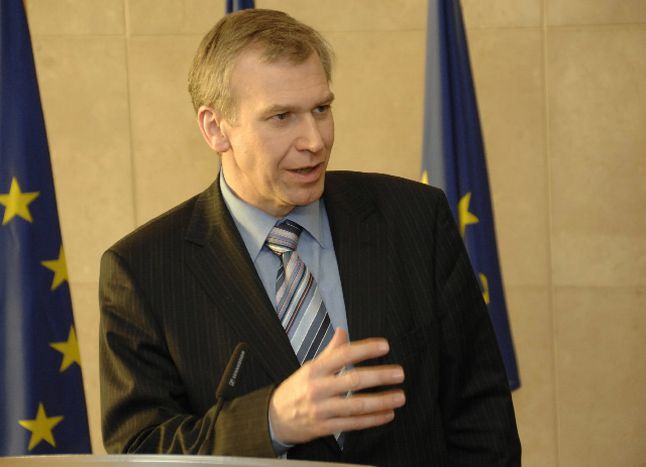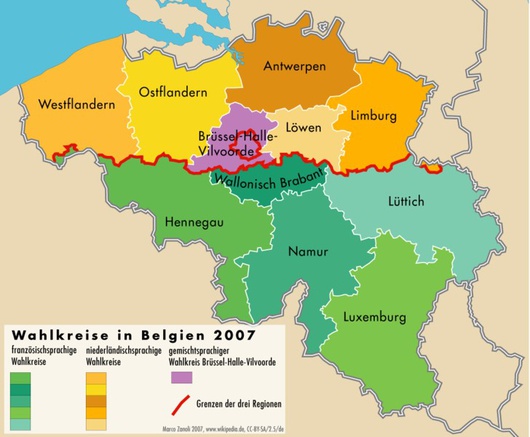
Yves Leterme: good things come in three’s
Published on
Translation by:
Nabeelah ShabbirBelgian prime minister Yves Leterme threw the towel in for the third time on 15 July after his Flemish Christian democrat party CD&V failed to make political reforms. But King Albert II refused to accept the resignation. What is happening in Belgium?
It’s already the third time in a year that Belgian prime minister Yves Leterme voluntarily quits his official functions, only to take them up again. Two months after winning the legislative elections on 23 August 2007, he tendered his resignation when he failed to form a coalition government after a lack of consensus on state reforms between the Flemish and Walloon communities. An interim government was led by former prime minister Guy Verhofstadt. Leterme resumed his official position on 29 September 2007 after king Albert II sent an express petition.
His attempts at a compromise failed again on 7 November after the Flemish voted in a resolution which would have split the electoral region of Brussels-Halle-Vilvoorde, which would have denied the French-speaking community of certain rights. Weeks later, coalition talks were rebooted between the Flemish and Walloons. They avoided sensitive issues, but were due to present a second package of reforms before mid-July.
‘Reactivate institutional dialogue’
It was in fact this second reform package which gave Leterme politically itchy feet again. On the night of 14 - 15 July, he tendered his resignation officially to the king. The action was almost banal.
After a few days of reflection, the king rejected the resignation on 17 July, reaffirming the prime minister in his official role. This time there was an added nuance, endorsing Leterme with a three-membered advisory committee, two of whom would be francophone. The aim was to ‘reactivate institutional dialogue in a credible manner.’ The problem though was that the Flemish were underrepresented in this new block, which riled the nationalists, including the NVA.
National split
Belgium finds itself in an intricate situation, a mire whose origins can be traced in the original institutional architecture of the country. In fact, since the united confederate state was abolished in Belgium in the sixties, three instutional levels (federal state, regional and communitary) have superimposed complex relations.
 Special statuses such as celectoral and judicial districts like Brussels-Halle-Vilvoorde have to be added to this list. In this latter part of Belgium, which includes the border between the Flemish and Walloon regions drawn up in the sixties, the francophones enjoy certain rights including the possibility of voting in francophone party lists, or to go to the courts in French. Whilst the Flemish view the split in this district as the only condition to be able to resume negotiations, the francophones cling on to their privileges.
Special statuses such as celectoral and judicial districts like Brussels-Halle-Vilvoorde have to be added to this list. In this latter part of Belgium, which includes the border between the Flemish and Walloon regions drawn up in the sixties, the francophones enjoy certain rights including the possibility of voting in francophone party lists, or to go to the courts in French. Whilst the Flemish view the split in this district as the only condition to be able to resume negotiations, the francophones cling on to their privileges.
The Flemish and Walloon politicians oppose two differing concepts of the country. The Flemish would like more autonomy and confederalism, if not independence. However the Walloons support national unity and the federal state. There are multiple, often socio-economic reasons for this split. Whilst Wallonia is going through serious economic difficulties linked to deindustrialisation, Flanders prospers and grumbles louder about sharing their resources with Wallonia. There is a common dynamic nationalist Flemish identity linked with this. Extreme right Flemish party Vlaams Belang gets around 30% of the votes in cities like Anvers.
Nevertheless according to the surveys, the Belgian population seems to be less interested in this subject, and more preoccupied by more daily difficulties such as the loss of purchasing power.
Translated from Yves Leterme : et de trois !



